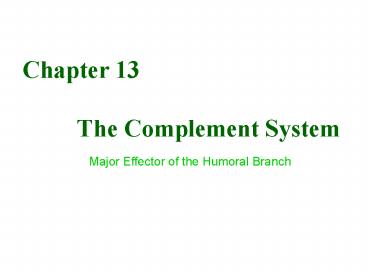The Complement System - PowerPoint PPT Presentation
1 / 26
Title:
The Complement System
Description:
Produced by hepatocytes, monocytes and epithelial cells of the gastrointestinal ... Sialic acid found in mammalian cells. inactivates C3b ... – PowerPoint PPT presentation
Number of Views:191
Avg rating:3.0/5.0
Title: The Complement System
1
Chapter 13 The Complement System
Major Effector of the Humoral Branch
2
1919 Nobel Prize Jules Bordet
Complement-mediated
bacteriolysis Paul Erhlich
complement - the activity of
serum that completes the action
of antibody
3
- Complement Components
- More than 30 soluble and cell-bound proteins
- Participate in both innate and acquired immunity
- Produced by hepatocytes, monocytes and epithelial
cells of the gastrointestinal and genitourinary
tracts - Constitute 5 (by weight) of the serum globulin
fraction - Circulate in the serum in functionally inactive
forms - Many components are proenzymes, which are
inactive until proteolytic cleavage, which
removes an inhibitory fragment and exposes the
active site.
4
The Functions of Complement 1. Lysis of
cells, bacteria, and viruses 2. Opsonization,
which promotes phagocytosis of particular
Ags 3. Binding to specific complement receptors
on cells of the immune system, triggering
activation of immune responses such as
inflammation and secretion of
immunoregulatory molecules that amplify or alter
specific immune responses 4. Immune
clearance, which removes immune complexes
from the circulation and deposits them in the
spleen and liver
5
(No Transcript)
6
Complement Activation Classical Pathway
Alternative Pathway Lectin Pathway
7
(No Transcript)
8
(No Transcript)
9
(No Transcript)
10
(No Transcript)
11
(No Transcript)
12
(No Transcript)
13
(No Transcript)
14
(No Transcript)
15
(No Transcript)
16
(No Transcript)
17
Sialic acid found in mammalian cells inactivates
C3b
Unstable thioester bond
18
Formation of bound C5b by the alternative pathway
19
The Lectin Pathway
- Lectins are proteins that bind to carbohydrates
- MBL (mannose-binding lectin) bind mannose
residues on microorganisms - MBL is structurally and functionally similar to
C1q - MASP MBL-associated serine protease,
structurally similar to C1r and C1s - MASP1 2 bind to MBL and cleave C4 and C2.
20
Formation of Membrane-Attack Complexes (MAC) on
the cell surface
Poly-C9 complex MAC on a
red blood cell
21
Lysis of an E. coli by complement
22
C1 inhibitor binds C1r2s2, causing Dissociation
from C1q
Association of C4b and C2a is blocked by binding
C4b-binding Protein (C4bBP)
CR1, factor H, and MCP prevent Binding of C3b and
Factor B
23
C3 convertases are dissociated by C4bBP, CR1,
Factor H and decay accelerating Factor.
24
S protein prevents insertion of C5b67 into
membrane
Homologous restriction factor (HRF) and Membrane
Inhibitor of reactive lysis (MIRL) Prevent
assembly of poly C9
25
(No Transcript)
26
(No Transcript)

